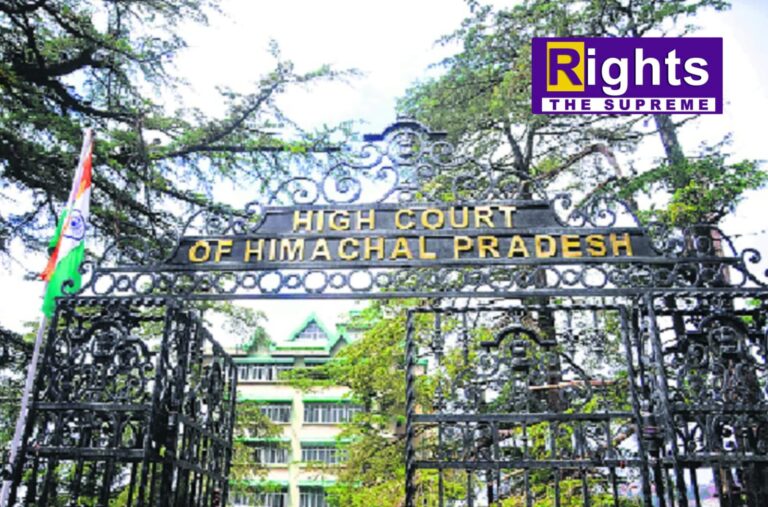Introduction
In a significant judgment delivered on July 11, 2024, the Himachal Pradesh High Court has clarified that advocates aspiring to become district judges are not required to have a continuous seven years of practice. This significant decision emphasizes that the total experience of seven years is sufficient for eligibility, regardless of whether this practice was uninterrupted.
Background and Legal Context
The case arouse when Sandeep Sharma who had secured the second position in the selection process, Challenged the appointment of Praveen garg who appointed as Additional district judge in Himachal Pradesh. Sandeep Sharma questioned Praveen garg eligibility and argue that he had not continuous experience of practicing law for seven years prior to application.
This ambiguity in the interpretation of eligibility criteria outlined in the rules governing judicial appointments. In Rule 5(c) of the Himachal Pradesh Judicial Service Rules, 2004 – Rule 5(c) Explains the Provision as – Practicing advocate at the Bar of a minimum period of seven years as on the last date fixed for receipt of the applications.
In a recent judgment, the Himachal Pradesh High Court overturned this interpretation, ruling that the requirement for seven years of practice does not need to be continuous. This decision is expected to open doors for many qualified advocates who had previously been disqualified due to gaps in their practice history.
It is not mentioned specifically anywhere in the Rule 5(c) of the Himachal Pradesh Judicial Service Rules, 2004 that it is mandatory to practice as a advocate for continuous 7 years there is no such mention of continuous word in the rule 5(c). Traditionally, many interpreted the requirement of "seven years' practice" to mean an unbroken period of professional practice.
This interpretation posed challenges for many qualified advocates who had gaps in their practice due to various reasons such as personal commitments, health issues, or other professional engagements. The advocates argued that their cumulative experience in legal practice exceeded seven years, but they had not practiced continuously without interruption. They contended that the interpretation of "continuous" practice was restrictive and unjust.
The Court's Ruling
The Honorable Division Bench, comprised of Chief Justice M.S. Ramachandra Rao and Justice Satyen Vaidya, emphasized the necessity for a broader and more encompassing interpretation of the term.
They underscore the significance of the term "experience" rather than "continuous." The fundamental requirement is to ascertain that candidates possess substantial legal expertise and experience. The stringent criterion of continuous practice for seven years does not serve a logical purpose in the selection of advocates for judicial appointments.
The bench also mentioned the Article 233(2) of The constitution of india which describe the eligibility criteria of judges in district court. The article 233(2) speaks as, A person not already in the service of the Union or of the State shall only be eligible to be appointed a district judge if he has been for not less than seven years an advocate or a pleader and is recommended by the High Court for appointment.
Implications
This landmark decision is likely to have several implications for the legal profession:
Broader Eligibility: The new interpretation will broaden the pool of candidates eligible for district judge positions, potentially bringing in a more diverse range of experienced professionals.
Career Flexibility: It acknowledges the reality that many lawyers may have had valid interruptions in their careers due to various personal or professional reasons, and it ensures that these interruptions do not unfairly disadvantage them.
Revised Standards: The ruling may prompt a review of similar eligibility criteria in other states and judicial contexts, leading to a more inclusive approach to the selection of judges.
The ruling has several significant implications for the legal profession:
Expanded Eligibility: By removing the requirement for continuous practice, the Court has broadened the pool of potential candidates for district judge positions. This change allows for greater inclusivity and acknowledges diverse career paths within the legal profession.
Professional Flexibility: The decision provides a more realistic and accommodating framework for career interruptions, recognizing that many advocates might have valid reasons for gaps in their practice. This flexibility aligns with the evolving nature of professional careers.
Potential for Reform: The ruling may set a precedent for other jurisdictions, prompting a review of similar eligibility requirements in various states. It underscores the need for adaptable standards that reflect the varied experiences of legal professionals.
Reactions and Future Outlook
Legal experts and advocacy groups have welcomed the Court's decision, viewing it as a progressive step towards a more inclusive judiciary. Many believe that this change will encourage more advocates to aspire to judicial positions and bring a wider range of experiences to the bench.
The legal community has largely welcomed the High Court's decision, viewing it as a progressive step towards a more inclusive and representative judiciary. Legal experts and advocacy groups believe that this change will encourage more experienced advocates to pursue judicial appointments, thereby enriching the judiciary with a broader range of perspectives and expertise.
As the legal profession adapts to this new standard, there may be further discussions and potential reforms regarding judicial eligibility criteria across the country. The ruling signals a shift towards a more flexible and inclusive approach to judicial appointments, reflecting the dynamic nature of legal careers.
Conclusion
The Himachal Pradesh High Court's decision represents a substantial change in the criteria for judicial appointments, emphasizing the significance of legal expertise over rigid time constraints. By permitting interruptions in the mandatory seven years of practice, the court acknowledges the diverse professional paths of advocates and facilitates a more inclusive judiciary.
This decision broadens the pool of experienced advocates eligible for judicial positions, potentially enriching the judiciary with a variety of experiences and viewpoints. It acknowledges that career breaks do not diminish an advocate's legal acumen or competence.
As the legal community adjusts to this new standard, it is expected that similar reforms may follow, fostering a more adaptable and representative judicial system across the country.

